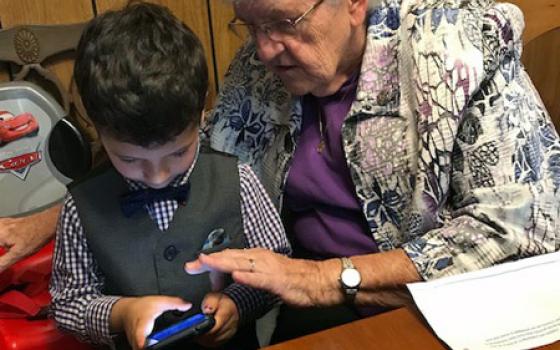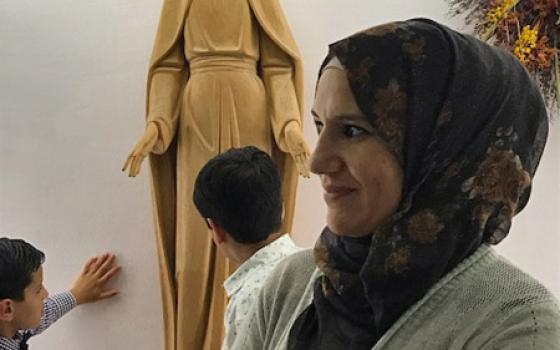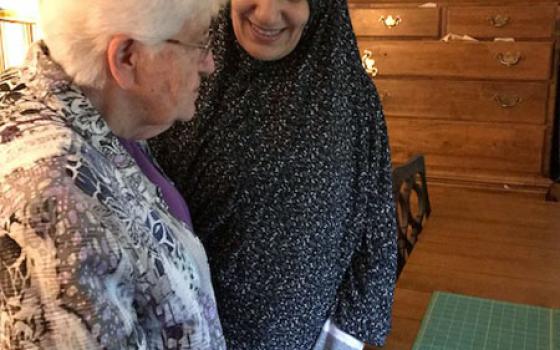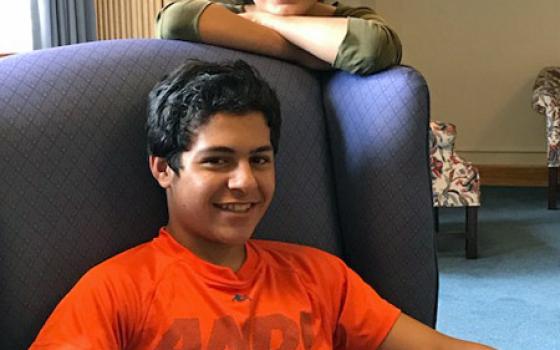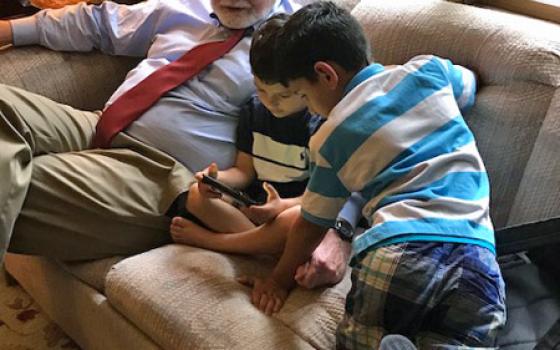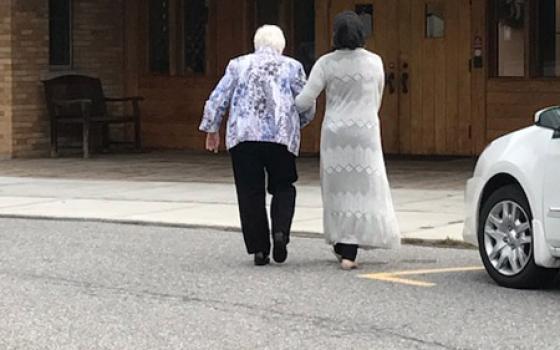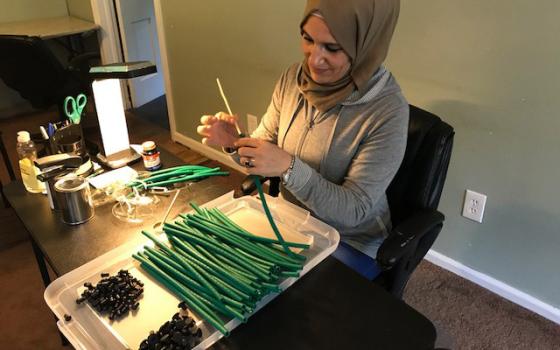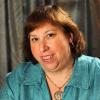Editor's note: This week (Jan. 7-13), the U.S. Catholic Church celebrates National Migration Week, "an opportunity for the Church to reflect on the circumstances confronting migrants, including immigrants, refugees, children, and victims and survivors of human trafficking." To commemorate the week, GSR brings you the story of a Syrian family that has found a home in Connecticut.
On a warm fall morning, Syria natives Mohammad and Bisan Alazzam excitedly recounted their visit to New York City the previous night. The 14- and 13-year-old siblings had traveled with school friends from the southwestern Connecticut town of Wilton to see their first Broadway show. Speaking over each other in a mixture of English and Arabic, they described Times Square and gossiped about their friends.
That kind of opportunity — a carefree outing — was just what their mother, Manal Mohammad Alazzam, hoped for when she began working toward resettling her family in the United States. Since March 2016, Alazzam and her five children have lived on the Wilton campus of the School Sisters of Notre Dame. The housing arrangement reflects a community living out the Gospel call to welcome the stranger, a Christian imperative the sisters see as increasingly urgent amid the global refugee crisis and President Donald Trump's anti-immigrant rhetoric and policies.
"It was never a question if we would take them in. They were a family who needed help," said Sr. Leonora Tucker, who coordinates the congregation's work with Alazzam and her children. The sisters are partnering with the Wilton Interfaith Action Committee, also known as Wi-ACT, in assisting the family.
More than 100 volunteers provide transportation, medical care, English lessons, babysitting and other types of support. They stop by the cream-colored house across the yard from Villa Notre Dame, home to about 100 retired sisters, dropping off food or picking up the children for school or an activity.
"It's a huge undertaking," said Steve Hudspeth, Wi-ACT chair. "We have the resources, and people want to help."
Alazzam is grateful for the support and has grown to trust Hudspeth and the sisters. She still speaks English haltingly, often looking to Tucker or her older children for help. She tells the story of her long journey from war-ravaged Syria to this quiet corner of Connecticut almost mechanically, in short, emphatic phrases.
"My kids were scared of the bombs," she said. "My house was bombed. [I left] so my children would be safe."
As a 30-year-old widow, she and her children, then 5 months to 10 years old, walked from their home in Syria to Jordan. For 15 days, she walked with the baby, Ghaith, in her arms and Yaqoub, then 3, strapped to her back. Mohammad, Bisan, and Ahmad, then 10, 9, and 6, respectively, stayed close, carrying a few of the family's belongings.
"Sometimes we slept in the grass," she said. "Sometimes sick. We needed medicine." They had little food, but "stopped to eat, then walk again."
Alazzam kept her eyes down and avoided interactions on the trip. She knew she and the children were especially vulnerable traveling without a man in a Muslim country. Her husband died in Jordan, but Alazzam did not want to share more than that.
In Jordan, they lived in a refugee camp.
"The water came in the tent," she said. "Not good for my kids. No money for diapers."
She cleaned toilets to earn money. After nine months, the family moved to a small apartment, and the older children went to school. But in Jordan, "they did not understand single woman and five children."
She filed paperwork seeking refugee status and waited, dreaming of a life where her children were safe, well-fed and educated. After three years, she got word the family would be resettled in the United States.
"America a big surprise for me and my kids," she said. "I like America for the kids and for college. My dream is to be a student again. Maybe I become a nurse."
Alazzam has relatives living in Georgia. She worries about her parents, who are still in Syria. But in Connecticut, her children are thriving, and she's optimistic about the future.
"Before, my kids worry about school, don't talk English," she said. "Now, everybody happy here. No Catholic and Muslim. This is one big family for me."
That's the atmosphere the sponsors hoped they could create.
"So many people wanted to help. People brought gifts and clothing and bikes," Hudspeth said.
"And we have rules and regulations about where they can ride the bikes," Tucker added quickly.
The pair's easy banter suggests a long relationship. But Hudspeth, a retired lawyer and Episcopalian who lives down the road from the villa, met the sisters only when they began planning to welcome Alazzam and her children.
"Getting to know the sisters has been a tremendous gift," Hudspeth said.
Wilton Interfaith Action Committee decided in December 2015 that it would work with New Haven-based Integrated Refugee & Immigrant Services, or IRIS, to support a Syrian refugee family. The organization had partnered with IRIS in 2010 to support an Iraqi family. Affordable, safe housing was a challenge then because of the high cost of living in Fairfield County, and it would be more difficult for a family of six.
At the same time, the School Sisters found themselves with an empty house on their property, which is home to the nuns' residence and Lourdes Health Care Center. A former School Sisters employee had recently moved out of the house, and they had heard the Wilton Interfaith Action Committee needed housing for a refugee family.
"Out of the blue, this request came, and we said yes," Tucker said. "There are no accidents. It was meant to be."
The School Sisters of Notre Dame had been discerning their response to Pope Francis' September 2015 call for religious communities to take in a family of refugees.
"The Gospel calls us, asks us to be near the least and the abandoned. To give them concrete hope, not just say 'Hang in there, have patience!' " the pope said at the time.
The pope's comments came after photos of 3-year-old Alan Kurdi's body washed up on a Turkish beach. The startling image shocked the world and focused attention on Syria's brutal civil war and the dangers people encountered as they fled the violence. By the time Alazzam and her children arrived in Wilton, more than 250,000 Syrians had died and more than 11 million others had been forced from their homes.
Connecticut had already established itself as open to refugees. In November 2015, Mike Pence, then governor of Indiana, was one of 26 state leaders to bar Syrian refugees from entering their states. In response, Gov. Dannel Malloy of Connecticut welcomed a Syrian family scheduled to resettle to Indiana; the family settled in New Haven. (Federal courts later struck down Pence's order as discriminatory.)
"We're praying the U.S. government would act more compassionately toward those seeking refuge in this country," said Sr. Charmaine Krohe, provincial leader. "We have to find a way for people to remain with us in a way that comports with our laws, but this country was built on immigrants and people who need a better way of life."
Welcoming Alazzam and her children was "natural for us," she said. "Our community is accustomed to responding to the urgent needs of our time, especially to the needs of the poor and marginalized."
The sisters were not concerned that the family was Muslim.
"It just mattered we were able to provide this kind of ministry and care to a family," Krohe said.
"They've developed a beautiful relationship, especially Leonora with Manal," said Dominican Sr. Arlene Flaherty, who coordinates the province's justice and peace office. "What's really striking is how the affection is part of the healing. It's been beautiful to watch the gradual unfolding of her new life."
Although it's challenging to keep track of the children and their busy schedules, "it's good to see them romping around," Krohe said. "We are an aging community, and those children bring a sense of joy and life to the property."
Hudspeth, who has five grandchildren, enjoys playing grandfather to Alazzam's children. He ferries the children to school, takes Mohammad to soccer practice, and helps with homework. Ghaith accompanies him on errands, often exchanging a few Arabic words with a local gas station employee.
"There's no typical week," Tucker said. "There's always something going on."
Some of the sisters, retired educators, provide English lessons. One taught the kids to swim in the villa's pool. Alazzam works full-time at Dampits International, a small local business that makes humidifiers for string instruments. She works on her English when she can, and she's started a sewing business to earn extra money.
"I do it all for my children," she said.
The sisters originally committed to providing temporary housing — six months to a year — for Alazzam's family. Eighteen months in, the family is on track to self-sufficiency, but they're staying put for now.
"We want the family to succeed," Krohe said. "We'll give them as much time as they need."
[Renée K. Gadoua is a freelance writer and editor in Syracuse, New York. Follow her on Twitter: @reneekgadoua.]
